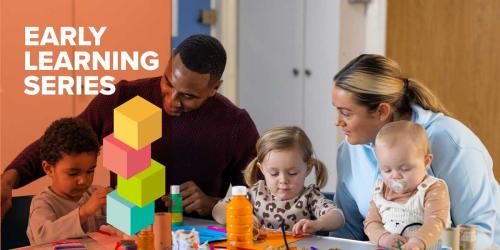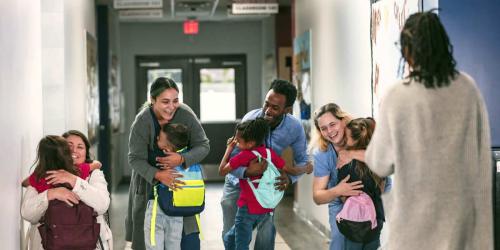Lessons from Family Engagement in Education Grantmaking

In traditional grantmaking, funders choose grantees—with little to no input from the communities ultimately intended to benefit. This type of grantmaking in education leaves families without a say in which programs support their children and how those programs operate.
The City of Seattle wanted to take a different approach. Believing that families should be decisionmakers, the Seattle Department of Education and Early Learning created an Equitable Communities Initiative investment to engage families in awarding grants to community-based organizations focused on family-school partnerships.
Over the past two years, our team at Education Northwest worked alongside the city and its partners to evaluate the initiative. Below, we share what we learned, along with considerations for other funders and organizations seeking to engage families in grantmaking.
What’s Possible When Families Guide Grantmaking and Implementation
Family Engagement Helped Align Investments to Community Priorities
In spring 2023, the Seattle Department of Education and Early Learning partnered with the Community Center for Education Results (CCER), the Road Map Project Parent Leadership Team, and staff members from local community-based organizations to co-design a Request for Investment focused on family-school partnerships. Instead of city staff members setting the criteria, families led conversations to name what mattered most: culturally responsive programming, services offered in families’ home languages, and supports that directly addressed barriers in navigating school systems.
These priorities became the foundation for evaluating proposals. Applicants were asked to show how they would amplify family voice (for example, sharing data with families or elevating leaders of color to positional authority) or meet the basic needs of students and families. Family leaders and organizational staff members then co-designed a scoring rubric, reviewed applications, interviewed candidate organizations, and recommended organizations to receive multiyear funding.
As a result, the city directed public dollars toward programs that not only reflected community priorities but also demonstrated concrete strategies to act on them: for example, expanding bilingual programming, investing in culturally rooted family engagement, and strengthening connections between schools and community hubs.
One staff member at a community-based organization reflected on the difference: “[In the past] we would listen to a parent group or parent panel, but then it’s the educators or the people in charge who ultimately make the decision. And with [this process], it was really the parents driving it. That was one of the things that was so impressive about working together.”
[In the past] we would listen to a parent group or parent panel, but then it’s the educators or the people in charge who ultimately make the decision. And with [this process], it was really the parents driving it. That was one of the things that was so impressive about working together.
Staff members at community-based organizations also noted that while the process expanded their own skills in authentic collaboration, there was a larger impact on city investment: ensuring that public funding flowed to programs accountable to families’ priorities.
Family Engagement Continued Through Grant Implementation, Resulting in Positive Outcomes
After funding was awarded, CCER, the Parent Leadership Team, and grantees worked together to center family voice in program implementation. CCER and the Parent Leadership Team convened quarterly meetings where grantees came together to share progress and review data, creating a feedback loop so that families continued to shape programming beyond the initial grantmaking. CCER and the Parent Leadership Team intentionally supported grantees to increase their capacity for data analysis and ongoing evaluation of their programming. Several grantees shared that they appreciated the resources and tools provided as well as the focus on shared ownership of data.
Grantees described how input from families influenced their services in real time. Families requested workshops on topics such as advocating for student rights in disciplinary processes, supporting children’s mental health, and ensuring internet safety. In response, grantees adapted their offerings to match these needs.
One family participant noted the importance of this responsiveness: “When we have a gathering, it is asked of the community, ‘What would you like to see? Are there any trainings that you can think of?’ And I think that’s really awesome because it shows that [they] do listen to the community.”
When we have a gathering, it is asked of the community, ‘What would you like to see? Are there any trainings that you can think of?’ And I think that’s really awesome because it shows that [they] do listen to the community.
Families reported that the programming helped them build practical skills, expand their support networks, and reach family goals. They also emphasized the importance of transparency from community-based organizations, noting that honest communication deepened trust and strengthened the partnerships.
One parent said, “That’s where the trust comes from: when somebody shares everything with you and what’s going on, and how’s your kids doing, and what they need to do or what they need, and how we can support them at home. So that’s why I have my trust in them.”
That’s where the trust comes from: when somebody shares everything with you and what’s going on, and how’s your kids doing, and what they need to do or what they need, and how we can support them at home. So that’s why I have my trust in them.
In turn, grantees said this ongoing collaboration strengthened their capacity to engage families as partners and decisionmakers.
Family Engagement Required Time and Capacity
Grantees stressed that while family engagement is powerful, it is also resource intensive. Ongoing dialogue, feedback loops, and programming adjustments all require time and staff capacity. Limited funding cycles add to the challenge, leaving organizations concerned about sustainability and the risk of losing momentum.
While families appreciated what they learned from short-term programming such as workshops, some grantees said that longer-term, recurring engagement with families would better support systemic change.
Future Considerations
Based on what we learned, here are key takeaways for other funders and community-based organizations looking to engage families in grantmaking and grant implementation.
For Funders
- Co-design funding opportunities with the communities most impacted by inequities. When families have a seat at the table, they can lift up the needs of their community and collaborate with practitioners and funders to support effective grantmaking.
- Design flexible funding structures so grantees can respond to emerging community needs and priorities. Grantees shared how important it was to adapt to the needs of families, and they often pivoted workshop topics to make programming more relevant and useful.
- Find ways to lessen the reporting burden for grantees. For organizations with small teams, it can be challenging and time-consuming to comply with different reporting requirements for different grants or funders. Reducing or aligning reporting requirements would allow grantees to focus on family engagement and programming.
For Community-Based Organizations
- Invite families and youth to choose topics for workshops and offer opportunities for co-facilitation. This can make programming more responsive, relevant, and useful. In addition, participants may benefit from hearing directly from other families and youth in workshops.
- Communicate transparently with families. Families appreciate honesty, and it can help build trust between families and the organization’s staff.
- Make events and workshops accessible to families. Prioritizing inclusion and removing barriers makes it easier for families to access programming. The Roots of Inclusion Community Conversation Toolkit is one useful resource for planning inclusive events, with suggestions for hosting events in multiple languages and at a convenient location and time.
- Consider opportunities for longer-term engagement with families to sustain momentum and promote systemic change.
Learn More About Family Engagement
Education Northwest’s family engagement team partners with education systems, philanthropic organizations, and their communities to advance systemic, evidence-based, and effective family engagement. Explore our family engagement resources and services or contact a member of our team to learn how we can support family engagement work in your community.
Read the Family Governance Fund for Education: Aligned Partners Evaluation to learn more.
Marbella Uriostegui is a senior researcher who specializes in equity in educational systems, multilingual students, and youth sociopolitical development. She uses research and service to create pathways for marginalized young people to excel by strengthening family-school-community relationships, diversifying the educator workforce, and developing safe spaces where students can thrive.
Mary Padden is a senior researcher who specializes in family engagement and participatory research methods. She believes that authentic collaborations between schools and families are essential to the well-being of students and communities.
Julie Petrokubi is a managing researcher focused on youth social, emotional, and civic development in school and community settings. She takes an ecological system approach that considers young people within the context of their peers, families, schools, and communities. Julie is passionate about empowering and engaging youth and families both within and outside of school systems.



